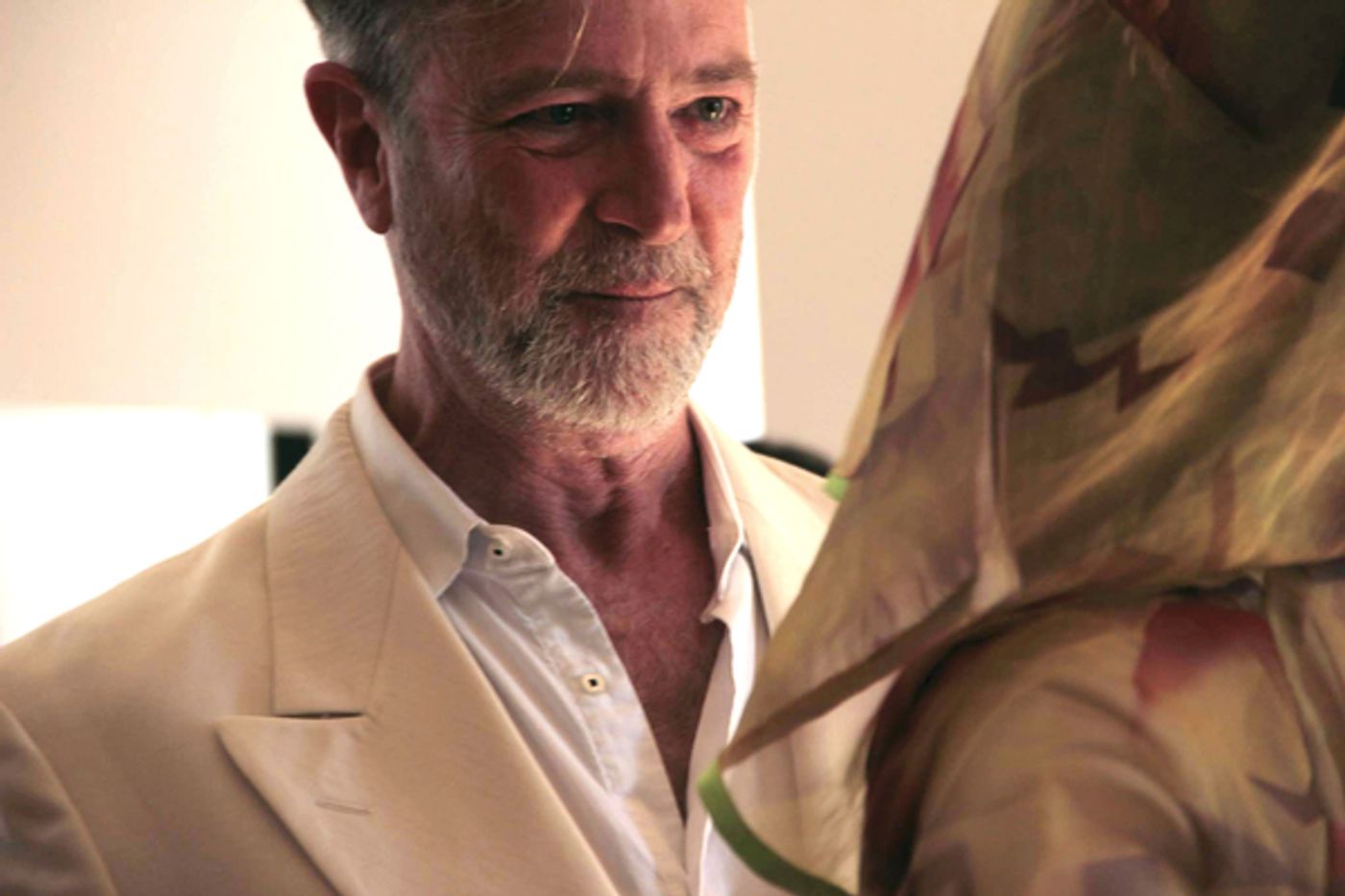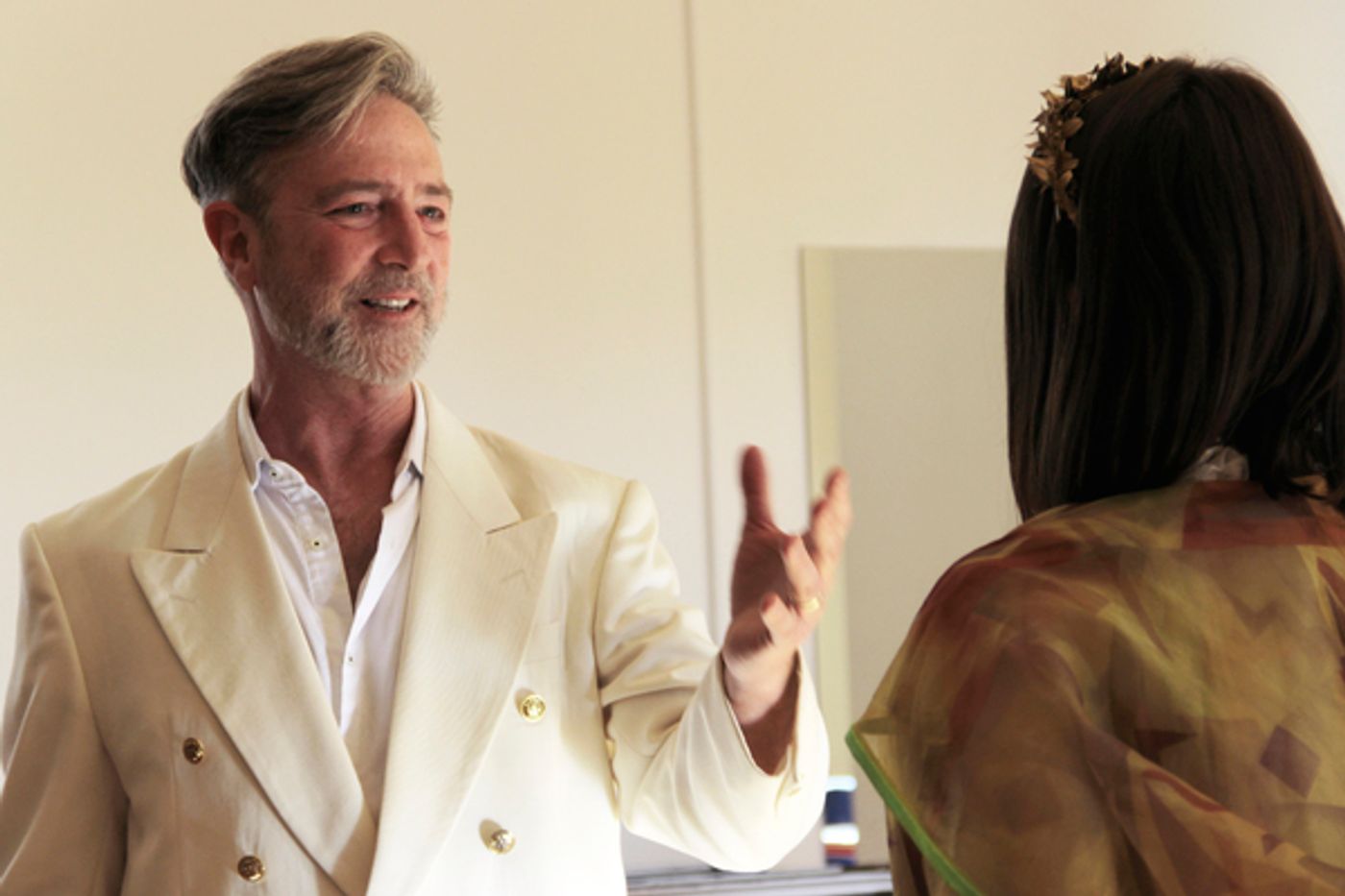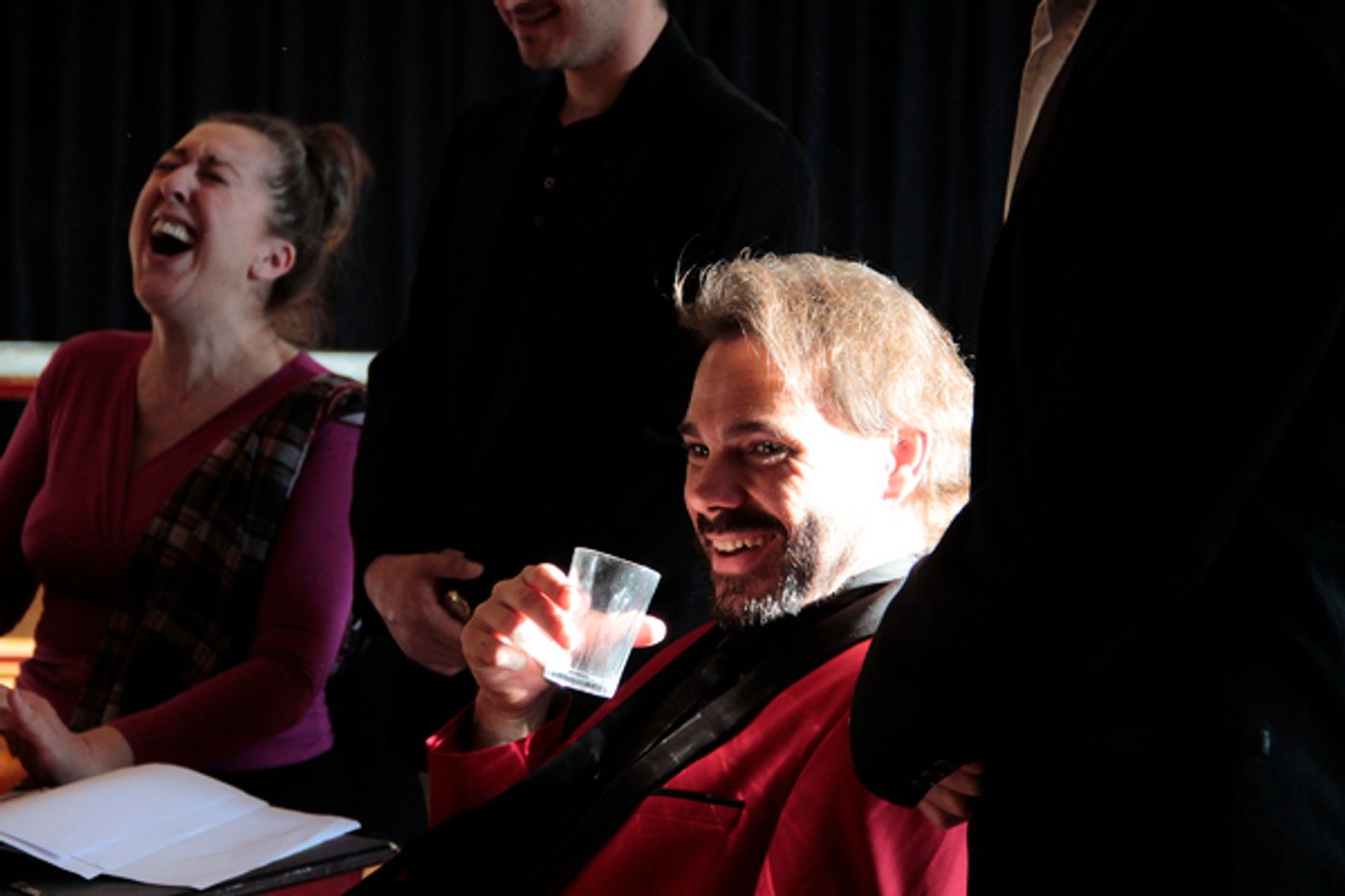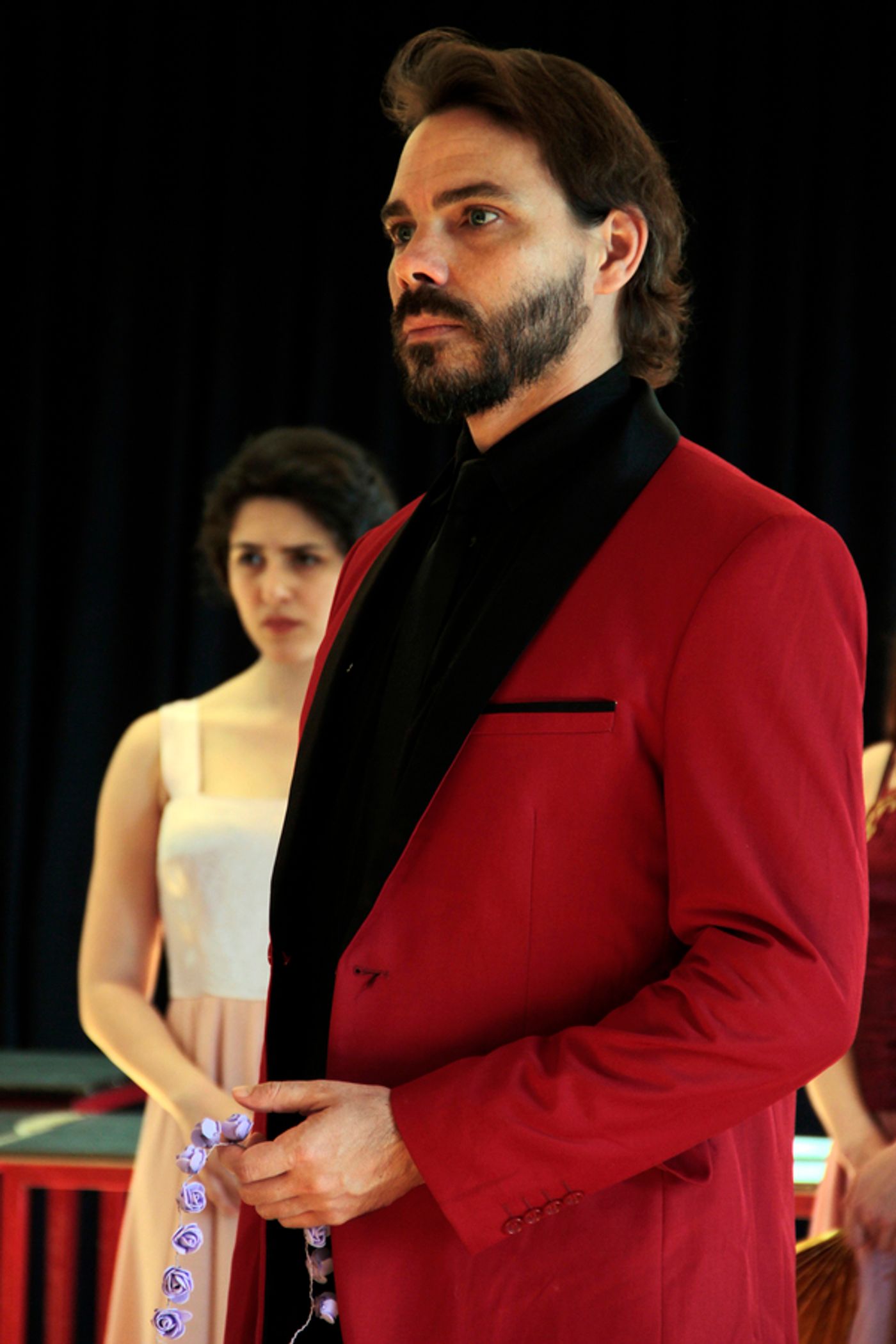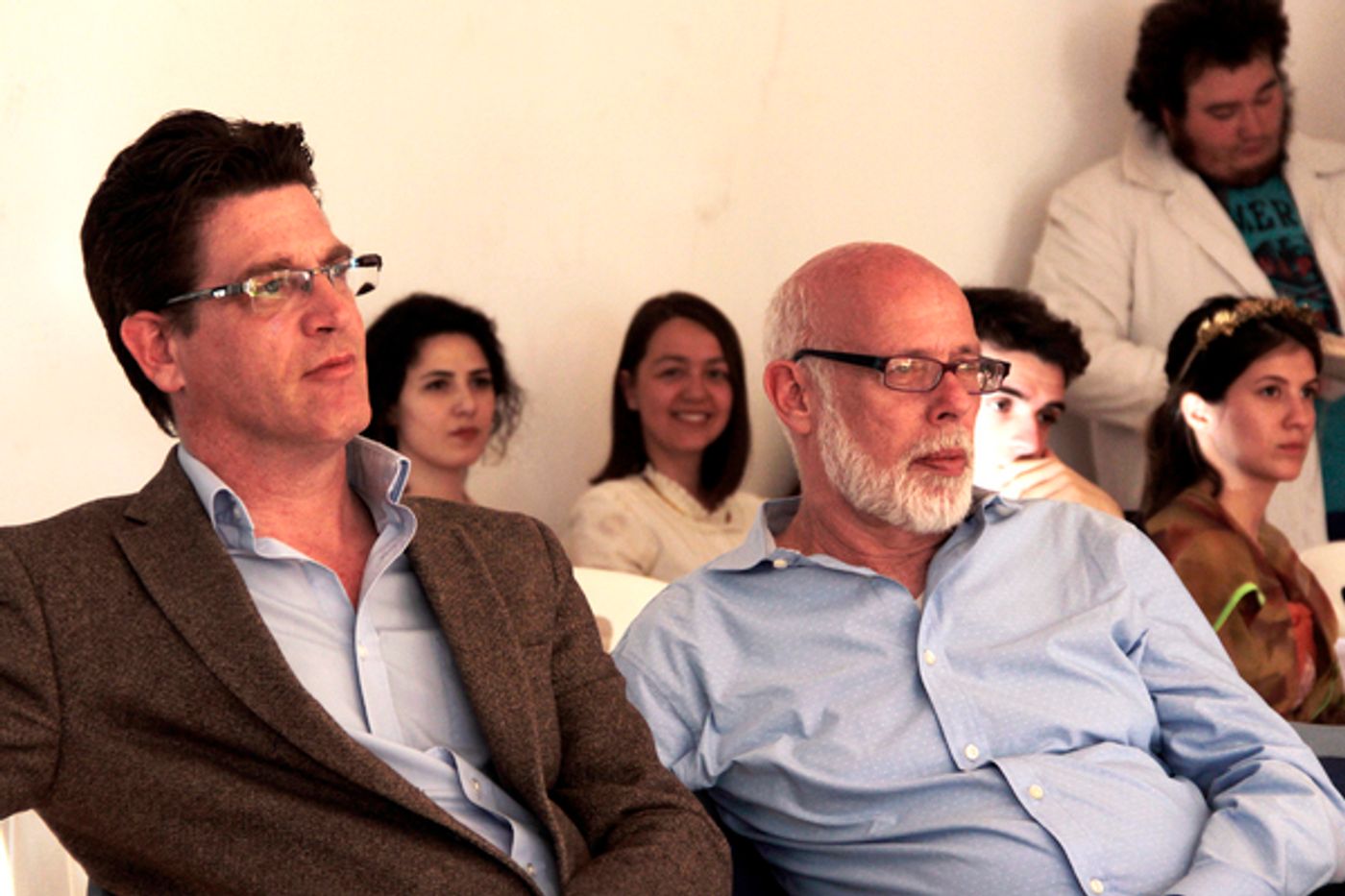Photo Flash: Provincetown TW Festival ANTONY & CLEOPATRA IN TURKEY
During a two-week residency in March at Bilkent University in Ankara, Turkey, performers from the U.S. and South Africa rehearsed alongside Turkish undergraduate theater students and faculty on a new international staging of the 400-year-old tragedy Antony and Cleopatra.
Directed by Festival Curator David Kaplan, the show will take a prominent place in this year's Festival, which will celebrate connections between Tennessee Williams and William Shakespeare in Provincetown from Sept. 21-24.
Kaplan plans to anchor this year's Festival with a special, one-day-only performance of the first half of Antony and Cleopatra on Sunday, Sept. 24 at the historicTown Hall in Provincetown.
This work in progress will be presented in association with Bilkent University, which was founded in 1984 as the first private university in Turkey. Several Turkish actors from Bilkent plan to travel to Provincetown to take part in the Festival performance.
A Global Cast
"David Kaplan created an environment that was all about exploration," says Jason Hale, Chair of the Theatre Department at Bilkent.
The residency began with two days of general Shakespeare workshops, Hale says, before shifting into rehearsals for Antony and Cleopatra. The residency also included an open rehearsal presentation in the university's 700-seat symphony orchestra hall on March 27, in celebration of World Theatre Day.
For rehearsals with the Turkish students, Kaplan was joined by the Los Angeles-based actor Robertson Dean (who directed and performed in last year'sKirche, Küche, Kinder) and by actor Marcel Meyer from Cape Town, South Africa, whose company Abrahamse-Meyer Productions has collaborated with the Festival for many years, most recently for last year's productions of Desire Under the Elms and A Perfect Analysis Given By a Parrot.
Dean will play Marc Antony, while Meyer will play Octavius Caesar (Augustus). American actor and Festival favorite Jeremy Lawrence will play Lepidus. Four actors from Turkey - including two Bilkent faculty members who are stars of the Turkish National State Theatre - have been sponsored by Bilkent University to continue the work they began in Ankara, playing several roles including Sextus Pompey.
These actors will be joined onstage in Provincetown by Obie Award-winning actor Everett Quinton, who last appeared at the Festival in 2016 to direct In the Bar of a Tokyo Hotel. A longtime member of the queer-surrealist Ridiculous Theatrical Company in New York, Quinton will play "one of the Cleopatras," says Kaplan.
This unusual casting detail - that the queen of Egypt will be played by several actors - is driven by Kaplan's interest in "dramatizing the appropriation" of that famous figure.
"Who is Cleopatra?" says Kaplan. "It depends on whom you ask. She's African. She's Greek. She's an aging boy actor. She's a fantasy projection. She's an exotic temptress. She's a wise ruler. She's Sarah Bernhardt. She's Claudette Colbert. She's Liz Taylor. In this production, I want to dramatize that. Who she is depends on who's telling the story."
Living History
Turkey proved a dramatic and relevant setting in which to rehearse a play that so strongly echoes the histories of this part of the world.
During their two-week residency, Kaplan and the artists took a day trip to Ankara's ancient Monumentum Ancyranum to read the inscription of the "Deeds of the Divine Augustus," carved there on behest of the first Roman emperor - a main character in Antony and Cleopatra - before his death in 14 A.D. The emperor who bested Antony and Cleopatra wrote the history; Augustus proclaims his victories, but doesn't mention his opponents by name.
Today, Ankara - a cosmopolitan capital located near the center of the country - enjoys a reputation as a center for the performing arts, including national theater companies, the State Opera and Ballet, and the Presidential Symphony Orchestra. Bilkent University enrolls roughly 13,000 students, 90 percent of whom are native Turkish. The school's medium of instruction is in English.
"Kaplan has brilliant insights, but he puts things in very simple terms," Hale says. "It's to his credit that his openness brings students in. Working with someone like David expands our students' understandings of world directors and world theater."
As for Kaplan and the visiting artists, Hale says, "I think their eyes were widened by a better understanding of Turkish culture. Turkey strongly embraces Western theater - like Williams, Miller, and O'Neill - and the audiences who go to see shows in this country are varied and diverse, from teenagers to intellectuals to working class people."
Hale, an American expat living and working in Turkey for the past four years, has 25 years of experience as an actor, director, and teacher of acting in the U.S. and internationally. He took a faculty position at Bilkent after his award-winning 2011 production of The Glass Menagerie at the National Turkish State Theater toured the country for two years, and was selected to perform at the International Sabanci Theater Festival in Adana and Istanbul.
Speaking to the Gods
For September's Festival performance at Town Hall, Kaplan explains, the audience will be seated in the balcony, while the actors perform down below. This will allow the production to play with distance.
"This is a play about who is telling the story, and to whom, and which stories we choose to believe," Kaplan says. "The story is begun by Octavian, which means you're first hearing about Antony and Cleopatra from someone who doesn't like them. We have an ongoing conflict, with Antony, Octavian, Cleopatra, and many other characters, all fighting to tell the story. It gives the audience a job: whose story do they follow? The players look up to address the audience, in the same way that actors in Shakespeare's Globe and in the Roman Colosseum looked up."
This one-off Sunday production will feature numerous actors and performers from other Festival shows, making it an important touchstone in this year's line-up.
Kaplan describes this production as a "tuning fork" of sorts. "It's like the dominant key in the music of this year's shows," he says, "and it will show audiences what all of our programming has in common this year - based on what two great masters of the English language were able to accomplish using language and nothing else."
For the Provincetown showing on Sept. 24 at Town Hall, Lefty Lucy will design the costumes, and Dan Jackson will design the set - a minimal space that will include only tables and chairs. As Kaplan puts it: "this is not a play about palm trees and pyramids."
Shakespeare and Williams
This year, the Festival inquires into one simple question: what can we see in Shakespeare's plays by looking through the lens of Tennessee Williams?
"Williams and Shakespeare both moved seamlessly, in the later years of their writing, from tragedy to farce and back again, within the same work," Kaplan says. "This is very true in Antony and Cleopatra. It's also a play, like much of Williams, that is encrusted with a history of misunderstandings." The play, while intimate, centers on an urgently political story - a far cry from romances like Romeo and Juliet.
"Like our season, this play ultimately is about the reconciliation of opposites - East and West, male and female, Rome and Egypt, modernity and tradition, love and death - and how adults learn to live with that," Kaplan says. "Romeo and Juliet die young, but adults have to learn to live with ambivalence in an unsure world. This is also what Williams is talking about in his later plays: the mix of farce and tragedy, something we live with in America today."
This is why Kaplan's production of Antony and Cleopatra this year will only run through the end of Act 3, Scene 2.
"At that moment in the play, the characters are in the same kind of bubble that Williams so often presents: a floating bubble of hope," he says. "When audiences watch a Williams play, they are aware that the bubble is going to fall, but they still hope that it doesn't. Can we see this happen in a Shakespeare play, too? I think so - and we can make it funny and satisfying, too."
About the Provincetown Tennessee Williams Theater Festival
The Provincetown Tennessee Williams Theater Festival was founded in 2006 in Provincetown - the birthplace of modern American theater - where Williams worked on many of his major plays during the 1940s. The TW Festival is the nation's largest performing arts festival dedicated to celebrating and expanding an understanding of the full breadth of the work of America's great playwright. Each year, theater artists from around the globe perform classic and innovative productions to celebrate Williams' enduring influence in the 21st century, hosted by venues throughout the seaside village. For more details, visit twptown.org and follow the Festival on Facebook.
This Festival is funded in part by the Provincetown Tourism Fund, and is presented by Sage Inn & Lounge.
Photo credit: Mehmet Nebi Savci
Videos



